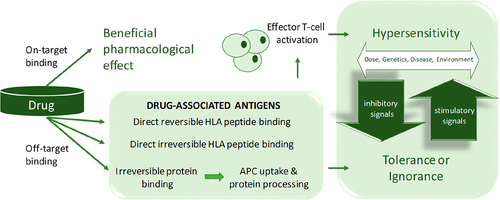当前位置:
X-MOL 学术
›
Chem. Res. Toxicol.
›
论文详情
Our official English website, www.x-mol.net, welcomes your
feedback! (Note: you will need to create a separate account there.)
T-Cell Activation by Low Molecular Weight Drugs and Factors That Influence Susceptibility to Drug Hypersensitivity.
Chemical Research in Toxicology ( IF 3.7 ) Pub Date : 2019-11-20 , DOI: 10.1021/acs.chemrestox.9b00327 Sean Hammond 1 , Paul J Thomson 1 , Monday O Ogese 1 , Dean J Naisbitt 1
Chemical Research in Toxicology ( IF 3.7 ) Pub Date : 2019-11-20 , DOI: 10.1021/acs.chemrestox.9b00327 Sean Hammond 1 , Paul J Thomson 1 , Monday O Ogese 1 , Dean J Naisbitt 1
Affiliation

|
Drug hypersensitivity reactions adversely affect treatment outcome, increase the length of patients' hospitalization, and limit the prescription options available to physicians. In addition, late stage drug attrition and the withdrawal of licensed drugs cost the pharmaceutical industry billions of dollars. This significantly increases the overall cost of drug development and by extension the price of licensed drugs. Drug hypersensitivity reactions are characterized by a delayed onset, and reactions tend to be more serious upon re-exposure. The role of drug-specific T-cells in the pathogenesis of drug hypersensitivity reactions and definition of the nature of the binding interaction of drugs with HLA and T-cell receptors continues to be the focus of intensive research, primarily because susceptibility is associated with expression of one or a small number of HLA alleles. This review critically examines the mechanisms of T-cell activation by drugs. Specific examples of drugs that activate T-cells via the hapten, the pharmacological interaction with immune receptors and the altered self-peptide repertoire pathways, are discussed. Furthermore, the impacts of drug metabolism, drug-protein adduct formation, and immune regulation on the development of drug antigen-responsive T-cells are highlighted. The knowledge gained from understanding the pathways of T-cell activation and susceptibility factors for drug hypersensitivity will provide the building blocks for the development of predictive in vitro assays that will prevent or help to minimize the incidence of these reactions in clinic.
中文翻译:

低分子量药物对T细胞的活化作用以及影响药物超敏性的因素。
药物超敏反应会对治疗结果产生不利影响,延长患者的住院时间,并限制医生可获得的处方选择。此外,后期药物消耗和许可药物的撤回使制药业损失了数十亿美元。这显着增加了药物开发的总体成本,并延长了许可药物的价格。药物超敏反应的特点是起效延迟,重新接触后反应往往更严重。药物特异性T细胞在药物超敏反应的发病机理中的作用以及药物与HLA和T细胞受体的结合相互作用的性质的定义仍然是深入研究的重点,主要是因为易感性与一个或少量HLA等位基因的表达有关。这篇评论严格审查了药物激活T细胞的机制。讨论了通过半抗原激活T细胞,与免疫受体的药理相互作用以及改变的自身肽库途径的药物的具体实例。此外,突出了药物代谢,药物-蛋白质加合物形成和免疫调节对药物抗原反应性T细胞发育的影响。通过了解T细胞活化途径和药物超敏性的易感性获得的知识将为预测性体外测定的发展提供基础,这些测定将预防或帮助减少临床中这些反应的发生率。这篇评论严格审查了药物激活T细胞的机制。讨论了通过半抗原激活T细胞,与免疫受体的药理相互作用以及改变的自身肽库途径的药物的具体实例。此外,突出了药物代谢,药物-蛋白质加合物形成和免疫调节对药物抗原反应性T细胞发育的影响。通过了解T细胞活化的途径和药物超敏性的易感性而获得的知识将为预测性体外测定的发展提供基础,这些测定将预防或帮助减少临床中这些反应的发生率。这篇评论严格审查了药物激活T细胞的机制。讨论了通过半抗原激活T细胞,与免疫受体的药理相互作用以及改变的自身肽库途径的药物的具体实例。此外,突出了药物代谢,药物-蛋白质加合物形成和免疫调节对药物抗原反应性T细胞发育的影响。通过了解T细胞活化途径和药物超敏性的易感性获得的知识将为预测性体外测定的发展提供基础,这些测定将预防或帮助减少临床中这些反应的发生率。讨论了与免疫受体的药理相互作用和改变的自身肽库途径。此外,突出了药物代谢,药物-蛋白质加合物形成和免疫调节对药物抗原反应性T细胞发育的影响。通过了解T细胞活化途径和药物超敏性的易感性获得的知识将为预测性体外测定的发展提供基础,这些测定将预防或帮助减少临床中这些反应的发生率。讨论了与免疫受体的药理相互作用和改变的自身肽库途径。此外,突出了药物代谢,药物-蛋白质加合物形成和免疫调节对药物抗原反应性T细胞发育的影响。通过了解T细胞活化途径和药物超敏性的易感性获得的知识将为预测性体外测定的发展提供基础,这些测定将预防或帮助减少临床中这些反应的发生率。并突出了对药物抗原反应性T细胞发育的免疫调节。通过了解T细胞活化途径和药物超敏性的易感性获得的知识将为预测性体外测定的发展提供基础,这些测定将预防或帮助减少临床中这些反应的发生率。并突出了对药物抗原反应性T细胞发育的免疫调节。通过了解T细胞活化途径和药物超敏性的易感性获得的知识将为预测性体外测定的发展提供基础,这些测定将预防或帮助减少临床中这些反应的发生率。
更新日期:2019-11-21
中文翻译:

低分子量药物对T细胞的活化作用以及影响药物超敏性的因素。
药物超敏反应会对治疗结果产生不利影响,延长患者的住院时间,并限制医生可获得的处方选择。此外,后期药物消耗和许可药物的撤回使制药业损失了数十亿美元。这显着增加了药物开发的总体成本,并延长了许可药物的价格。药物超敏反应的特点是起效延迟,重新接触后反应往往更严重。药物特异性T细胞在药物超敏反应的发病机理中的作用以及药物与HLA和T细胞受体的结合相互作用的性质的定义仍然是深入研究的重点,主要是因为易感性与一个或少量HLA等位基因的表达有关。这篇评论严格审查了药物激活T细胞的机制。讨论了通过半抗原激活T细胞,与免疫受体的药理相互作用以及改变的自身肽库途径的药物的具体实例。此外,突出了药物代谢,药物-蛋白质加合物形成和免疫调节对药物抗原反应性T细胞发育的影响。通过了解T细胞活化途径和药物超敏性的易感性获得的知识将为预测性体外测定的发展提供基础,这些测定将预防或帮助减少临床中这些反应的发生率。这篇评论严格审查了药物激活T细胞的机制。讨论了通过半抗原激活T细胞,与免疫受体的药理相互作用以及改变的自身肽库途径的药物的具体实例。此外,突出了药物代谢,药物-蛋白质加合物形成和免疫调节对药物抗原反应性T细胞发育的影响。通过了解T细胞活化的途径和药物超敏性的易感性而获得的知识将为预测性体外测定的发展提供基础,这些测定将预防或帮助减少临床中这些反应的发生率。这篇评论严格审查了药物激活T细胞的机制。讨论了通过半抗原激活T细胞,与免疫受体的药理相互作用以及改变的自身肽库途径的药物的具体实例。此外,突出了药物代谢,药物-蛋白质加合物形成和免疫调节对药物抗原反应性T细胞发育的影响。通过了解T细胞活化途径和药物超敏性的易感性获得的知识将为预测性体外测定的发展提供基础,这些测定将预防或帮助减少临床中这些反应的发生率。讨论了与免疫受体的药理相互作用和改变的自身肽库途径。此外,突出了药物代谢,药物-蛋白质加合物形成和免疫调节对药物抗原反应性T细胞发育的影响。通过了解T细胞活化途径和药物超敏性的易感性获得的知识将为预测性体外测定的发展提供基础,这些测定将预防或帮助减少临床中这些反应的发生率。讨论了与免疫受体的药理相互作用和改变的自身肽库途径。此外,突出了药物代谢,药物-蛋白质加合物形成和免疫调节对药物抗原反应性T细胞发育的影响。通过了解T细胞活化途径和药物超敏性的易感性获得的知识将为预测性体外测定的发展提供基础,这些测定将预防或帮助减少临床中这些反应的发生率。并突出了对药物抗原反应性T细胞发育的免疫调节。通过了解T细胞活化途径和药物超敏性的易感性获得的知识将为预测性体外测定的发展提供基础,这些测定将预防或帮助减少临床中这些反应的发生率。并突出了对药物抗原反应性T细胞发育的免疫调节。通过了解T细胞活化途径和药物超敏性的易感性获得的知识将为预测性体外测定的发展提供基础,这些测定将预防或帮助减少临床中这些反应的发生率。











































 京公网安备 11010802027423号
京公网安备 11010802027423号